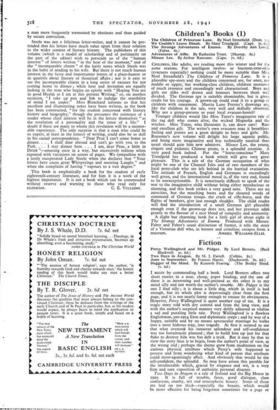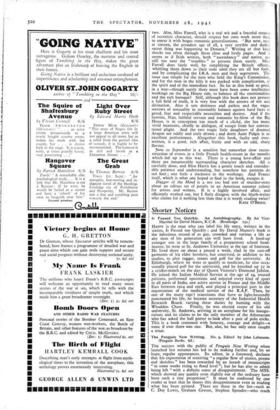Fiction
Percy Wallingford and Mr. Pidger. By Lord Berners. (Basil Blackwell. 3s. 6d.) Two Days in Aragon. By M. J. Farrell. (Collins. 8s.) 7s. 6d.)
I BEGIN by commending half a book. Lord Berners offers two short stories in a neat, cheap, paper binding, and the one of these is as interesting and well-pointed as the other is to my mind silly and not worth the author's trouble. Mr. Pidger is the one I find silly ; it is about a little dog, which in itself is bad enough, but its whole plot is depressingly clear from the first page, and it is not nearly funny enough to excuse its obviousness. However, Percy Wallingford is quite another cup of tea. It is a tragic story told with dry control and from the long view, and with the author's sceptical manner very deftly adjusted to vitalise a sad and puzzling little tale. Percy Wallingford is a flawless Englishman, pre-1914 Eton and diplomatic corps ; and by way of a happy, suitable and by no means spectacular marriage he walks into a most hideous trap, into tragedy. At first it seemed to me that what overtook his innocent splendour and self-confidence was too fortuitously planned; that to build him up just for that fluke to destroy him was too deft a trick. But it may be that to view the story thus is to begin, from the author's point of view, it the wrong end ; perhaps the ;lieme grew from meditation on the curious physical attribute which Percy's wife happened to possess and from wondering what kind of person that attribute could mostmagonisingly affect. And obviously that would be the self-confident, the splendid. So may have arisen this parable for the invulnerable which, traced by elegance and wit, is a very firm and sure exposition of authentic personal disaster.
Two Days in Aragon is a tale of Ireland and the Big House in 1920. It is full of trouble, farce, good dialogue, class confusions, cruelty, wit and atmospheric beauty. Some of these are laid on too thick—especially the beauty, which would be more effective for being forgotten sometimes for a page or two. Also, Miss Farrell, who is a real wit and a forceful creator of eccentric character, should respect her own work more than to smear it with bogus romantic generalisations. " But now, now at sixteen, the proudest age of all, a very terrible and darkly secret thing was happening to Donatia." Writing of that kind shocks too often through these close and lively pages. And it seems as if Irish writers, both " ascendancy " and native, are still too near the " troubles " to present them surely. Miss Farrell does fairly well, by simplifying the British officers, whittling them down zo their code until they are all but fools, and by complicating the I.R.A. men and their supporters. The issue was simple for the men who held the King's Commission, and for the men in the hills it was packed with complication, of the spirit and of the immediate fact. So far in this book so good, in a way—though surely there must have been some intellectual workings on the Big House side, to balance all the emotionalism and the rich baroque? Still, although this book does not present a full field of truth, it is very free with the arrows of wit and divination. Also it sets dottiness and pathos and the vague sorrows of sensuality in reasonable balance against hard facts of greed, fear and respectable necessities and desires. And if the heroine, Nan, faithful servant and romantic by-blow of the Big House, is in conception too much of a cliché, she has many vivid moments, chiefly in dialogue, of escape from her conven- tional plight. And the two tragic little daughters of doomed Aragon are oddly and truly drawn ; and dotty Aunt Pidgie is an excellent performance. Altogether this book, faulty and over- written, is a good, rich affair, fruity and with an odd, sharp flavour.
lune to September is a sensitive but somewhat slow recon- struction of events in a little French health-resort in the months which led up to this war. There is a young love-affair and there are innumerable surrounding character sketches. All is carefully done, and Miss Harris has a gentle touch and consider- able patience and understanding, but somehow her patterns do not knit ; one feels a slackness in the workings. And France itself, which is what one hoped to find in the book, escapes it. Dagger of the Mind is a not too bad sort of murder-story about an odious set of people in an American summer colony for artists and writers. It is a highly involved affair, and efficiently worked out, but I flatly disagree with the blurb-writer who claims for it nothing less than that it is worth reading twice!
KATE O'BRIEN.



























 Previous page
Previous page